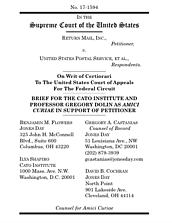Learn more about Cato’s Amicus Briefs Program.
Return Mail, Inc. is a small technological company that developed a and patented a system for processing returned mail after a failed delivery attempt, using optical scanners, computer databases, and other mechanisms. When it sought to enforce its patent against the United States Post Service (USPS), it knew that in the wake of the 2011 America Invents Act (AIA), the U.S. Patent and Trademark Office (PTO) could change its mind and conclude that the patent was granted in error and should have no further force. It also knew, however—or so it thought — that once the government made a decision regarding a patent, the government would be expected to speak with one voice. Instead, two different governmental agencies came to different conclusions and attempted to argue amongst themselves over Return Mail’s rights.
Article II of the Constitution vests the executive power in the president alone because the president is uniquely accountable to the entire American public. Yet the USPS, although part of the government, operates independently of direct presidential control and is able to take legal positions that conflict with presidential directives and priorities. The Supreme Court has permitted the creation of such agencies, but it has never sanctioned these agencies to directly contradict presidential decisions and to seek the resolution of such disputes in the judiciary branch.
Such a system creates significant problems for the public in general, because it can never know who is actually speaking for the government and which directives it must comply with. It’s particularly problematic in the world of patents—which Congress from very early on determined must have uniform application throughout the country and charging a single agency with reviewing applications and a single court with hearing all appeals. Allowing myriad government agencies to reach their own conclusions on the meaning and scope of patents would undermine the system that Congress has taken pains to construct over more than 200 years (regardless of the proper scope of patents and other legislative reforms that may be worth pursuing).
Further, allowing the government to disperse the executive power between the president and independent agencies has a risk of undermining the due process protections that must be afforded to patentees before their patent rights are taken away. The Supreme Court has always maintained that patentees’ rights are protected by the essential guarantees of the Due Process Clause. Under the current system for administrative patent cancellation proceedings, the director of the PTO (who is responsible to the president and terminable at will) has the power to select administrative patent judges and assign them to particular cases. In cases where an executive agency seeks review of a patent issued by the PTO, the government — through that agency — has an interest in the outcome of the proceedings, but it is also the one sitting in judgment of the case. Our system of government has rejected procedures where one can be a judge in his own case. Allowing one government agency to challenge a patent while another government agency sits in judgment of that challenge would undermine more than 400 years of Anglo-American jurisprudence.
The Cato Institute, joined by Professor Gregory Dolin of the University of Baltimore, have filed an amicus brief urging the Supreme Court to hold that fidelity to our constitutional structure requires construing the AIA to apply solely to the resolution of disputes between private parties where the PTO remains a neutral and disinterested adjudicator and where politically accountable branches remain responsible to the citizens for the decisions that they have reached.

This work is licensed under a Creative Commons Attribution-NonCommercial-ShareAlike 4.0 International License.
